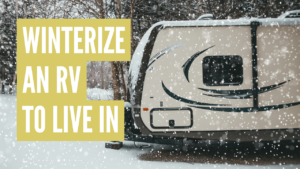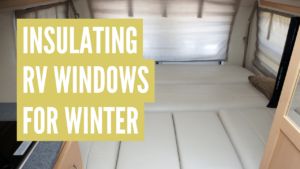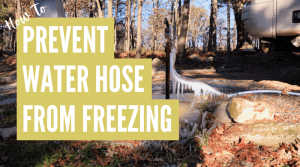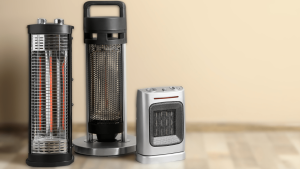Winter is coming, and so are the challenges of living in an RV during the frosty season.
To ensure you’re prepared, let’s look at whether you need to winterize your RV if you live in it and tips to ready your camper for the cold season ahead.
Do I Need to Winterize My RV if I Live In It Full Time?
Yes, even if you live in your RV full-time, it’s still important to winterize it. Winterizing your RV to live in involves protecting its systems and you, from the cold, such as insulating the RV, using heat tape on water lines, and sealing gaps to the outside. This ensures that you can continue to live comfortably in your RV throughout the winter months, and it helps prevent potential damage from freezing temperatures.
However, the process is different compared to RV winterization for storage, as you’ll need to keep the systems operational.
Factors that Determine the Need for Winterizing Your RV
When it comes to winterizing your RV to live in, several factors come into play. These factors can significantly influence the extent to which you need to prepare your RV for the winter months.
Geographical Location
The geographical location of your RV is a crucial factor in determining the need for winterization. If your RV is located in a region with mild winters, for example, southern Arizona, the need for extensive winterization may be less than an RV in an area with harsh winter conditions. Regions with freezing temperatures, heavy snowfall, and icy conditions will require more thorough winterization to protect the RV’s systems from freezing and potential damage.
Heating System Efficiency
The efficiency of your RV’s heating system also plays a significant role in determining the need for winterization. A properly-sized, highly efficient heating system will help maintain a comfortable temperature inside the RV, reducing the risk of freezing. However, suppose the heating system is inefficient or is under-sized. In that case, it may struggle to maintain a warm temperature, increasing the risk of freezing and the need for extra winterization measures.
Insulation Levels
The level of insulation in your RV can also impact the need for winterization. RVs with “Four Season Packages” or those with high levels of insulation can help keep the cold air out and the warm air in, reducing the need for additional heating and winterization. On the other hand, RVs with poor insulation may require additional measures, such as adding insulation to windows, doors, and floors, to keep the RV warm in winter.
Understanding these factors can help you assess the level of winterization required for your RV. Remember, every RV is unique, and what works for one might not work for another. Therefore, it’s essential to consider these factors in the context of your specific RV and situation.
Potential Risks of Not Winterizing an RV
Neglecting to winterize your RV can lead to a host of problems, some of which can cause significant damage and result in costly repairs. Here are some potential risks associated with not properly preparing your RV for the winter months.
Freezing and Damaging the Plumbing System
One of the most likely risks of not winterizing your RV is the potential for the plumbing system to freeze. When water freezes, it expands, which can cause pipes, tanks, and faucets to crack or burst. This can lead to water leaks, water damage, and the need for expensive repairs. Even a small crack can result in a significant leak, and locating and repairing these leaks can be a time-consuming and costly process.
Risk of Personal Harm
One of the most severe risks of not properly winterizing your RV is the potential for personal harm. If temperatures drop extremely low, there’s a risk of hypothermia or even freezing to death, especially if your RV’s heating system fails and you’re not adequately prepared. It’s crucial to ensure your RV is well-insulated and heated and to have contingency plans in place in case of heating system failure.
Higher Energy Costs
Without proper winterization, your RV may also be less energy efficient. If your RV is not well-insulated, heat will escape more easily, meaning your heating system will have to work harder to maintain a comfortable temperature. This can lead to higher energy costs, whether you’re using propane, electricity, or another type of fuel for your heating system.
Winterizing Tips for Full-Time RV Dwellers
Winterizing your RV is essential to preparing for winter, especially for full-time RV dwellers. The process involves taking steps to protect your RV’s systems from the harsh winter weather, ensuring that you can continue to live comfortably in your RV throughout the cold months.
Important: Check out our full step-by-step guide on winterizing a camper to live in for the exact process to safely and comfortably live in your camper full-time during the winter months.
Here are some tips to help you winterize your RV for full-time winter living.
RV Heating System
The RV heating system plays a crucial role in maintaining a comfortable temperature inside your RV during winter. Regularly check your heating system to ensure it’s working efficiently. If your RV is not maintaining a warm temperature, it may be time to service or upgrade your heating system.
Also, consider using space heaters as an additional heat source when temperatures drop below freezing.
RV Insulation
Proper insulation is key to keeping the cold air out and the warm air in. Insulate your windows, doors, and floors to prevent drafts and heat loss. You can use insulating foam, heat tape, or even thermal curtains to improve insulation. Remember, every bit of insulation helps when it comes to staying warm in winter.
RV Skirting
RV skirting is a method of insulating the underside of your RV to prevent cold air from entering and heat from escaping. It can be particularly beneficial in protecting your water tanks and lines from freezing. Various types of RV skirting are available, from custom-made vinyl skirting to DIY foam board skirting. Choose the one that best fits your RV and budget.
RV Plumbing System
The plumbing system in your RV is particularly vulnerable to freezing in cold temperatures.
- Insulate your pipes with pipe wrap insulation, and use a pipe heating cable kit on your water lines to protect your plumbing system.
- Add some RV antifreeze to your holding tanks after every time you empty them.
- Consider using a small RV-safe heater in your wet bay to keep it above freezing.
Additional Winter RV Preparation Tips
- Maintain Tire Pressure: Regularly check your tires for proper pressure, as cold temperatures can cause the pressure to drop.
- Prepare for Snow Storms: If you’re camping in a location prone to snow storms, consider investing in a snow roof rake to remove snow from your RV’s roof.
- Utilize Natural Heat Sources: Take advantage of the sun’s natural heat by parking your camper in an open area. This exposure to sunlight can provide a natural heat source, helping you save on electricity or propane during the day.
- Manage Your Waste Water Tanks: Only drain your waste water tanks when full. Draining them when they are not full could lead to the contents freezing during the draining process. Also, remember to detach your hoses from the holding tank valves when they’re not in use.
- Stay Warm While You Sleep: Consider using sleeping bags, electric blankets, or simply using extra blankets for added warmth while you sleep.
- Prepare for Winter Roads: Be sure to have the proper tires on your RV if expect to be traveling in snowy and icy conditions.
- Check RV Park Rules: Before you do any sort of winterizing, check with your RV park to see if they have specific rules for winterizing your camper.
- Store Food Properly: Store food in airtight containers to prevent attracting mice and other rodents.
Winterizing your RV for full-time living involves a balance of protecting your RV from the cold while keeping its systems operational. With these tips, you’ll be better prepared to enjoy a comfortable living experience in your RV.







Write a comment